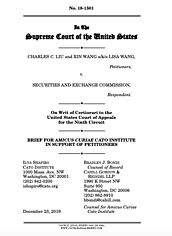Learn more about Cato’s Amicus Briefs Program.
In Kokesh v. SEC (2017), a unanimous Supreme Court held that a Securities and Exchange Commission disgorgement action “bears all the hallmarks of a penalty: It is imposed as a consequence of violating a public law and it is intended to deter, not to compensate.” Before Kokesh, the SEC had long argued that “disgorgement”—the seizure of a convicted inside-trader’s “ill-gotten gains”—did not fall under the five-year statute of limitations on the federal government’s pursuit of “any action, suit, or proceeding for the enforcement of any civil fine, penalty, or forfeiture, pecuniary or otherwise.” Although Kokesh thus rightly applied the standard statute of limitations to all SEC enforcement actions, it went too far in reading disgorgement into the detailed statutory scheme for pursuing civil penalties.
But disgorgement doesn’t fit neatly into any of the categories of remedies that Congress has specifically made available to the SEC in civil actions, and so cannot be pursued under federal securities laws. Nor can it be sought in equity, as the Court’s reasoning in Kokesh precludes the possibility of characterizing disgorgement as anything other than punitive. And courts sitting in equity cannot enforce punitive civil penalties. Kokesh should have made this clear, and we urge it do to so here—to finally offer its opinion that, in he absence of new legislation, courts don’t have the authority to order disgorgement in SEC enforcement proceedings.
With courts adrift, the SEC has for decades seen fit to pursue disgorgement penalties against inside-traders in an unprincipled and inconsistent manner. Contrary to the well-established principle that disgorgement’s central purpose “is to deter violations of the securities laws by depriving violators of their ill-gotten gains” (Kokesh), SEC actions frequently net awards in excess of the dollar value of such gains, leaving the defendant worse off than before.
That dynamic is evident in the case of Charles Liu and Xin Wang, who have been ordered to give up $26.4 million, well above the dollar amount of their ill-gotten profits, placing them roughly $16 million in debt. Such an excessive figure is typical of an SEC penalty award.
Congress first enabled the SEC to seek monetary penalties against public companies in 1990. At the time, it expected that the commission would seek them only when a securities-law violation improperly benefited shareholders, not when the shareholders were themselves victim. And for the first decade or so, the SEC behaved as Congress had hoped. But in 2002, the SEC penalized the Xerox Corporation $10 million—three times the size of any previous penalty for a similar case. By 2010, the SEC was extracting individual settlements as high as $550 million. While the SEC has lately practiced greater restraint, it still too often operates in contravention to Congress’s purpose.
As the Liu case, which the Supreme Court has decided to review, demonstrates, disgorgement amounts are often untethered to the underlying offence because the SEC has been given too-wide and unchallenged discretion. In Kokesh, the Court declined to rule on whether the SEC even had the statutory authority to seek disgorgement. But the reasoning there makes crystal clear that disgorgement is neither an equitable remedy, nor is it provided for in the federal civil monetary penalties scheme.
Cato urges the Court to break its self-imposed silence and hold that the SEC lacks any authority to pursue this boundless remedy. It’s time once and for all for the Court to destroy this Blob-like monster, before it disgorges us all!

This work is licensed under a Creative Commons Attribution-NonCommercial-ShareAlike 4.0 International License.
